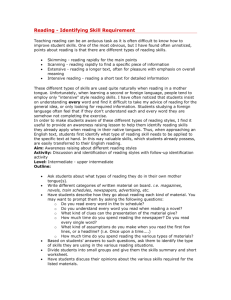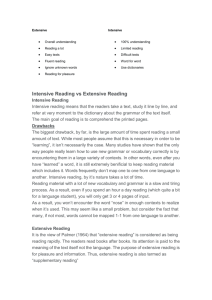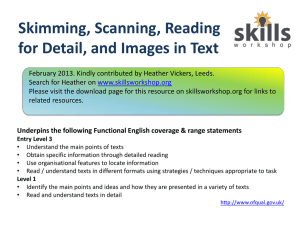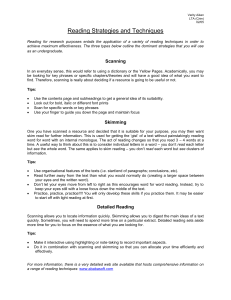Ways we read
advertisement
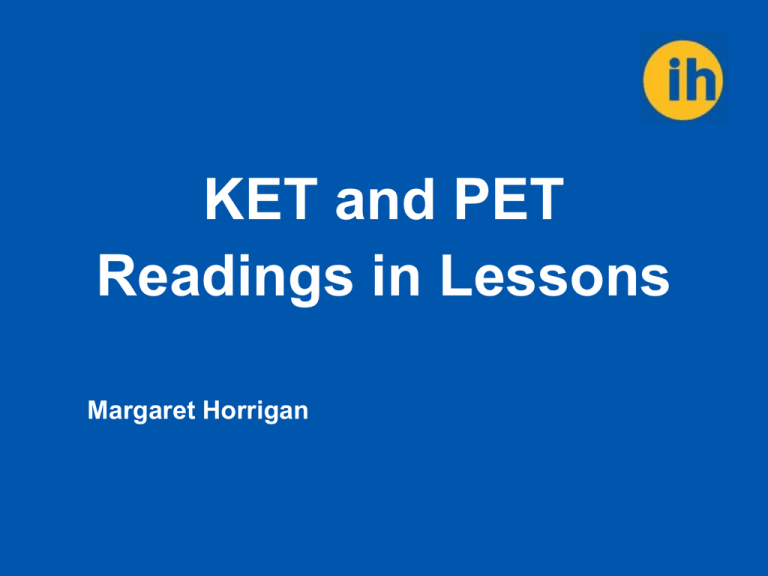
KET and PET Readings in Lessons Margaret Horrigan Overview of seminar Ways we read Texts we read KET Reading PET Reading Intensive Reading Tasks for class An example Theory into practice Roundup Ways we read… Ways we read Intensive Extensive Skimming Scanning Top down Bottom up Reading every single word for meaning Bringing our world knowledge to the text Reading to get the main idea Reading for specific details or items Reading a lot of different types of texts Ways we read Intensive Reading every single word for meaning Ways we read Intensive Extensive Reading every single word for meaning Reading a lot of different types of texts Ways we read Intensive Extensive Skimming Reading every single word for meaning Reading a lot of different types of texts Reading to get the main idea Ways we read Intensive Extensive Skimming Scanning Reading every single word for meaning Reading a lot of different types of texts Reading to get the main idea Reading for specific details or items Ways we read Intensive Extensive Skimming Scanning Top down Reading every single word for meaning Reading a lot of different types of texts Reading to get the main idea Reading for specific details or items Bringing our world knowledge to the text Ways we read Intensive Extensive Skimming Scanning Top down Bottom up Reading every single word for meaning Reading a lot of different types of texts Reading to get the main idea Reading for specific details or items Bringing our world knowledge to the text Reading every single word for meaning Texts we read Intensive/ Bottom up Extensive Skimming Scanning Top down 1. Notices 2. Newspaper articles 3. Magazine articles 4. Dictionary definitions 5. Postcards 6. Letters 7. Diary entries 8. Messages 9. Adverts 10. Emails 11. Labels 12. Novels KET Reading Tasks • Insert single words into sentences • Paraphrase notices from 3 options • Complete conversations from a choice of prompts • Insert the correct word from 3 options into a gapfilled text • Decide if sentences relating to a short text are right or wrong • Complete a message/note based on information from other adverts/messages • Write a word based on its definition • Complete a gapfilled text PET Reading Tasks • • • • • Match personal profiles to short texts Paraphrase notices from 3 options Insert the correct word from 4 options into a short gapfilled text Decide if information about an article type text is correct or not Choose the correct answers, from 4 options, to questions about a short text Sometimes we loose the bigger picture when we read at word level!!! Tasks to enhance intensive reading… Predicting text content using co-textual information such as headlines/titles/images Skimming texts for general idea Scanning for specific details Using questions to predict text content Scanning texts for key words used in questions Inferring meaning to unknown words from contextual clues Brainstorming vocabulary before reading Example 1… •For rent: Spacious 2 bedroom city flat near the underground. Parking spaces infront of flat. No smokers need apply. •For rent: Quaint old country house, large garden. 4 bedrooms, dining room, parlor, large kitchen with pantry. Outdoor toilet. •For rent: Large estate house. 10 bedrooms. Ample living quarters. Cellar converted into large home theatre. •For rent: Small country home. 3 bedrooms with ensuite bathroom in master bedroom. Large garden. Example 2… I liked to read what they liked to read: what they enjoyed, delighted me; what they approved, I reverenced. They loved their sequestered home. I, too, in the grey, small, antique structure,with its low roof, its latticed casements, its mouldering walls, its avenue of aged firs--all grown aslant under the stress of mountain winds; its garden, dark with yew and holly--and where no flowers but of the hardiest species would bloom--found a charm both potent and permanent. Example 3 … Indoors we ___(1)___ equally well. They were both more accomplished and ___(2)___ read than I was; but with eagerness I followed in the path ___(3)___ knowledge they had trodden before me. I devoured the books they ___(4)___ me: then it was full satisfaction to discuss with them in the ___(5)___ what I had perused during the day. Thought fitted thought; opinion met opinion: we coincided, in short, ___(6)___ . Strategies used in the Jane Eyre examples Top down: Brainstorming the specific needs of a person from their picture Intensive: choosing a single text from 4 possibilites based on key words. Top down: what do you know already about Jane Eyre? Top down: Brainstorming content for the possible titles Scanning: ’How much time did Jane spend reading?’ Skimming: to see if your ideas were mentioned Intensive: inferring meaning to words in the text Intensive: filling in gaps (open cloze test) Intensive: filling in gaps (multiple choice cloze test) Intensive: correct/incorrect statements Extensive: we divided a rather long text into 2 and read them as completely seperate texts. Theory into practice Choose a KET/PET reading Decide how you could get students to predict text content Use the exam tasks to draw students into predicting more about the text You have only 5 minutes to do this! You may refer to ideas used in this seminar to help you! Roundup Ways we read Texts we read KET Reading PET Reading Intensive Reading Tasks for class An example Theory into practice Cambridge ESOL Websites www.CambridgeESOL.it (in Italian) www.CambridgeESOL.org (in English)
